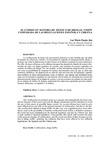Mostrar o rexistro simple do ítem
El comiso en materia de tráfico de drogas: visión comparada de las regulaciones española y chilena
| dc.contributor.author | Puente Aba, Luz María | |
| dc.date.accessioned | 2009-09-25T10:34:47Z | |
| dc.date.available | 2009-09-25T10:34:47Z | |
| dc.date.issued | 2006 | |
| dc.identifier.citation | Anuario da Facultade de Dereito da Universidade da Coruña, 2006, 10: 849-870 ISSN: 1138-039X | es_ES |
| dc.identifier.issn | 1138-039X | |
| dc.identifier.uri | http://hdl.handle.net/2183/2479 | |
| dc.description.abstract | [Resumen] La confiscación de bienes de procedencia delictiva es una medida que sin duda ha tratado de reforzarse, debido a la necesidad de impedir el enriquecimiento ilícito, y al deseo de evitar la utilización de tales bienes en la futura comisión de actos delictivos. Por ello, diversas reformas en los últimos tiempos han tratado de dotarla de mayor efectividad, no sólo a la figura genérica de comiso, sino también al comiso específico en materia de tráfico de drogas. En este sentido, se han introducido disposiciones novedosas como la posibilidad de enajenar los bienes decomisados antes de que se dicte una sentencia definitiva; tal disposición no sólo ha sido prevista por el legislador español, sino también en otros ordenamientos como el chileno, que guarda una similitud destacada con la normativa española en esta materia. Por lo tanto, se efectuará un examen del funcionamiento básico de la figura de comiso y de las recientes novedades de esta medida en materia de tráfico de drogas, analizando las soluciones aportadas por dos ordenamientos diferentes: el español y el chileno. | es_ES |
| dc.description.abstract | [Abstract] The confiscation of criminal assets is a measure that undoubtedly has been reinforced, because of the need to prevent the illegal enrichment and the intention to avoid the use of that assets in possible future crimes. So, recent reforms have tried to give more effectiveness, not only to the general measure of confiscation, but also to the specific confiscation related to drugs traffic. In this way, new regulations have been introduced, such as the possibility to transfer confiscated assets before a definitive sentence; this norm has been established by the Spanish legislator, and also by Chilean law, that is quite similar to Spanish legislation. Consequently, this article will examine the rules of the general measure of confiscation, and the recent novelties of this measure in relation to drugs traffic, analising the solutions that have been offered by two different legislations: the Spanish and the Chilean one. | es_ES |
| dc.language.iso | spa | es_ES |
| dc.publisher | Universidade da Coruña | es_ES |
| dc.subject | Comiso | es_ES |
| dc.subject | Confiscación | es_ES |
| dc.subject | Tráfico de droga | es_ES |
| dc.subject | Confiscation | es_ES |
| dc.subject | Drugs traffic | es_ES |
| dc.title | El comiso en materia de tráfico de drogas: visión comparada de las regulaciones española y chilena | es_ES |
| dc.type | info:eu-repo/semantics/article | es_ES |
| dc.rights.access | info:eu-repo/semantics/openAccess |






